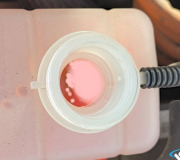Friday, October 5th, 2018 AT 1:39 PM
I have a cooling problem where my engine coolant becomes hot and and 'boils over' within the plastic coolant overflow tank and discharges out of the overflow tube. This condition happens after I have driven about 5 kms from a cold engine condition. At that point, I observe that the 2 (two) radiator cooling fans at the front have not even kicked in and not spinning at all. In this situation, I suspect two possible causes (although there could be more): (a) the thermostat is faulty and/or (b) the 2 radiator fans are spilt. I need to use the car today and is the weekend now so getting a new thermostat is a couple if days away. Is there a temporary fix that I can do today to get it on the road without harming the car engine? For example, is it okay to take out the thermostat, reseal the joint properly and drive the car without a thermostat for a couple of days while waiting for a new thermostat to arrive? And how do I hot wire the electrical wiring to test if each or both of these two radiator fans are working? Any urgent advice will be most appreciated. Also, if these two fans are indeed working, how to I put in a ‘all the time switched on’ condition as a temporary measure whenever I drive this car over these couple of days just so that I do not inadvertently overheat the engine while I sort out this car coolant overheating problem permanently? Of course, I am taking this time to also look for any leakage of engine coolant, leakage of built-up internal pressure and discharging captured internal air bubbles through proper ‘burping’ of the engine coolant. Your advice or feedback please. Many thanks in advance.



